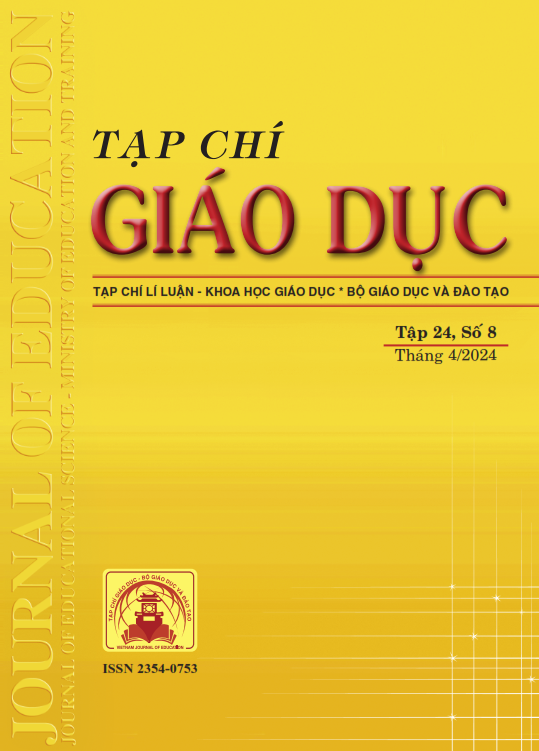Tiếp cận văn hóa toán học trong dạy học môn Toán ở trường phổ thông
Tóm tắt
Mathematics education is a culturally interactive process in which the student experiences culture. Therefore, mathematics education is not separate from various cultural phenomena surrounding human life. In teaching Mathematics, mathematical culture establishes the connection between mathematics and culture. This study presents the concept of mathematical culture and approaches to mathematical culture in teaching Mathematics in high schools in Vietnam. The author used the secondary document research method to analyze different concepts of mathematics educators around the world about mathematical culture and the role of mathematical culture in the process of teaching Math. At the same time, we provide directions for exploiting mathematical culture in teaching Mathematics through integrating the mathematical culture approach and integrating the history of mathematics. In addition, the article also includes some discussions on exploiting the concept of “mathematical culture” as well as approaching mathematical culture in teaching Mathematics.
Tài liệu tham khảo
Adam, S. (2004). Ethnomathematical ideas in the curriculum. Mathematics Education Research Journal, 16(2), 49-68. https://doi.org/10.1007/BF03217395
Aikpitanyi, L. A., & Eraikhuemen, L. (2017). Mathematics Teachers’ Use of Ethnomathematics Approach in Mathematics Teaching in Edo State. Journal of Education and Practice, 8(4), 34-38.
Albanese, V., & Perales, F. J. (2016). Ethnomathemathical dimensions for analysing teachers’ conceptions about mathematics. In CERME 9th Congress of the European Society for Research in Mathematics Education. ERME, 2015 (pp.1539-1543). Prague: Charles University in Prague, Faculty of Education. hal-01287828.
Bishop, A. J. (1994). Cultural conflicts in mathematics education: Developing a research agenda. For the Learning of Mathematics, 14(2), 15-18.
Brandt, A. & Chernoff, E. J. (2015). The importance of ethnomathematics in the math class. The Ohio Journal of School Mathematics, 71, 31-36.
Bùi Văn Nghị (2013). Dạy văn hóa toán học cho học sinh. Tạp chí Khoa học, Trường Đại học Sư phạm Hà Nội, 58, 3-7.
Burton, L. (2009). The culture of mathematics and the mathemamtical culture, In: Skovsmose O., Valero P., Christensen O.R. (eds). University Science and Mathematics Education in Transition. Springer, Boston, MA.
D’Ambrosio, U. (2001). What is ethnomathematics and how can it help children in schools? Teaching Children Mathematics, 7(6), 308-310.
D’Ambrosio, U. (2012). The program ethnomathematics: Theoretical basis and the dynamics of cultural encounters. Cosmopolis, 3(4), 13-41.
Đỗ Thị Lan Anh (2019). Một số biện pháp phát triển văn hóa toán học cho học sinh trong dạy học hình học không gian ở trường trung học phổ thông. Tạp chí Giáo dục, 451, 33-40.
Freudenthal, H. (1991). Revisiting mathematics education. Dordrecht: D. Reidel Publishing, Co.
Gerdes, P. (1996). Ethnomathematics and mathematics education. In A. Bishop, M. A. K. Clements, C. Keitel-Kreidt, J. Kilpatrick, & C. Laborde (Eds.). International Handbook of Mathematics Education (pp. 909-943). Kluwer Academic Publishers.
Gerdes, P. (2011). African basketry: Interweaving art and mathematics in Mozambique. In Bridges Coimbra Mathematics, Music, Art, Architecture, Culture Conference Proceedings (pp. 9-16). Coimbra: Tessellations Publishing.
Grabiner, J. V. (1975). The mathematician, the historian, and the history of mathematics. Historia Mathematica, 2, 439-447.
Hoàng Phê (chủ biên, 2008). Từ điển tiếng Việt. NXB Đà Nẵng.
Jahnke, H. N. (2000). The use of original sources in the mathematics classroom. In J. Fauvel & J. van Maanen (Eds.). History in mathematics education, the ICMI study (pp. 291-328). Dordrecht, The Netherlands: Kluwer.
Jankvist, U. T. (2009). A categorization of the “whys” and “hows” of using history in mathematics education. Educational Studies in Mathematics, 71, 235-261.
Jankvist, U. T. (2010). An empirical study of using history as a “goal”. Educational Studies in Mathematics, 74, 53-74.
Mác, C., & Ăngghen, Ph. (1995). Toàn tập. NXB Chính trị Quốc gia - Sự thật.
Massarwe, K., Verner, I., & Bshouty, D. (2012). Ethnomathematics and multicultural education: Analysis and construction of geometric ornaments. Journal of Mathematics and Culture, 6(1), 344-360.
Mogari, D. (2014). An in-service programme for introducing an ethnomathematical approach to mathematics teachers. Africa Education Review, 11(3), 348-364. https://doi.org/10.1080/18146627.2014.934992
Nguyễn Cảnh Toàn (2009). Nên học toán như thế nào cho tốt? NXB Giáo dục Việt Nam.
Rosa, M. (2013). Accessing the perceptions of high school teachers about the influence of language and culture in the mathematics learning of English language learners (ELLs) students. Linguistics, Culture and Education, 2(1), 36-71.
Rosa, M., & Orey, D. C. (2016). Developing mathematical modeling in virtual learning environments by applying critical and reflective dimensions. In K. Wallace (Ed.). Learning Environments: Emerging Theories, Applications and Future Directions (pp. 1-20). Nova Science Publishers.
Schoenfield, A. H. (1987). What’s all the fuss about metacognition? In Schoenfeld, A. H. (ed.), Cognitive Science and Mathematics Education, chapter 8, 189-215. Lawrence Erlbaum Associates.
Sfard, A. (1995). The development of algebra: Confronting historical and psychological perspectives. Journal of Mathematical Behavior, 14, 15-39.
Siu, M.-K. (2000). The ABCD of using history of mathematics in the (undergraduate) classroom. In V. Katz (Ed.), Using history to teach mathematics: An international perspective (pp. 3-9). Washington, DC: The Mathematical Association of America.
Trần Kiều (1998). Toán học nhà trường và yêu cầu phát triển văn hóa toán học. Tạp chí Nghiên cứu Giáo dục, 10, 25-28.
Tải xuống
Đã Xuất bản
Cách trích dẫn
Số
Chuyên mục
Giấy phép

Tác phẩm này được cấp phép theo Ghi nhận tác giả của Creative Commons Giấy phép quốc tế 4.0 .












